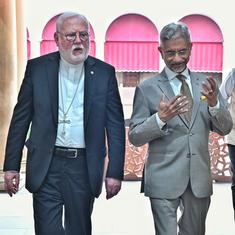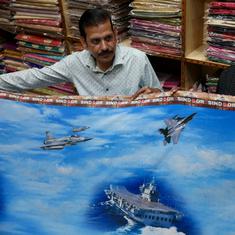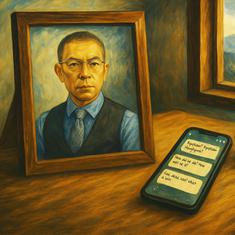It is impossible to think that India would lay claim to a military strike that it had not actually undertaken. At best, it could exaggerate the casualties it inflicted in last week's surgical strike and the strategic gains it has brought. Even the Opposition understands this.
That is why its voicing of doubts over the operation should be seen as a symptom of the complete breakdown in consensus over the norms of political conduct and the vision of what India ought to be. Linked to this is the Opposition's anxiety that Prime Minister Narendra Modi and his Bharatiya Janata Party will exploit the nationalistic fervour the operation has generated in future electoral battles.
Rightwing parties the world over have the tendency to stoke the fire of nationalism. The BJP possessed this trait even before Modi became prime minister. However, this default tendency now appears menacing because of Modi’s own record. During his years as chief minister of Gujarat, Modi turned then Pervez Musharraf, who was then Pakistan's president, into the western state’s very own foe, someone whom voters were exhorted to vanquish by backing the BJP. They did so, decimating the Opposition.
Wise to Modi’s strategy, the Opposition perhaps fears he will deploy the triad of nationalism, Pakistan and terror all over again. These fears are not unfounded – within hours of the surgical attacks, the Sangh Parivar spearheaded victory marches and then, days later, posters appeared across Uttar Pradesh declaring that India would beat Pakistan in its own land. These posters feature Modi and BJP President Amit Shah, suggesting that the Gujarati duo is all set to make poll-bound UP their new hunting ground.
Grabbing the credit
At a seminal level, the claims and counter-claims over the surgical attack signify the absence of norms governing the relationship between the ruling party and the Opposition. A month ago, the Modi government facilitated an all-party delegation to Kashmir to calm passions there. Following the surgical strike, the BJP has gone to hail the operation as an unprecedented strategic manoeuvre, boasting that it is the only party that has the daring to teach Pakistan a lesson.
The BJP cannot expect the Opposition to bail it out from a tight spot – and then arrogate to itself all the credit in another, related situation. It cannot ask for consensus on one issue of national importance, but refuse to build on another, just as significant.
The likelihood that the BJP will make the surgical strike an electoral issue has immediately invited a Congress riposte. The Congress has argued that the surgical strike is not unprecedented as is being made out. A few of its leaders have even given out the dates when then Prime Minister Manmohan Singh allowed the Army to cross the Line of Control – but did not, for strategic reasons, turn it into media headlines.
When an Army operation – nowhere near even a quasi-war like Kargil in 1999 – is turned into an electoral tool, when a mountain is made of out of a molehill, the BJP can't expect a free pass.
The Opposition’s scepticism of the government’s narrative on the surgical strike signals that there has been a breakdown in consensus even over security issues, which have till now been insulated from partisan politics. But this is an inevitable consequence of a combative politics that the BJP pursued, often instinctively, at times irrationally, when the Congress-led United Progressive Alliance was in power. The BJP derided Manmohan Singh as Maun-Singh, the Silent Man, stalled Parliament on minor issues, and disagreed on every policy issue out of pique.
Sections of the Congress, therefore, see no reason why they should not counter the BJP and Modi, even ignoring the possible consequences of outing evidence on the surgical attack. Playing publicly a video of the attacks, should such a recording exist, will likely goad Pakistan into escalating the tension along the Line of Control.
Then again, since it is believed Modi will anyway deploy the triad of nationalism, Pakistan and terror in the elections, the Congress perhaps thinks it is worth taking the risk to question the magnitude of the surgical strike – and also debunk the claim of it being unprecedented.
The gloves are off
From being instinctively combative against the United Progressive Alliance government, the BJP has now become imperious in power. Over the last 29 months, the BJP has ousted state governments, adopted mean tactics during elections in Bihar and Delhi, and Modi has tripped and paralysed the AAP government in Delhi.
It ought to have surprised no one that Delhi Chief Minister Arvind Kejriwal was first to question the surgical strike in a short video message. Kejriwal has done it shrewdly – he has saluted Modi and urged him to disprove Pakistan’s claims that India did not cross the Line of Control to launch the attack.
Yet everyone knows what he is hinting at – unless evidence of the strike is provided, the government’s narrative cannot be believed. What does Kejriwal really have to lose?
His government in Delhi has been paralysed. His is a fight to the finish with Modi. In case the Modi government provides evidence of the surgical strike, Kejriwal will claim that the pressure he brought on Modi led the prime minister to counter Pakistan’s propaganda. If no evidence is furnished, because of, say, strategic reasons, the doubts about the attack will only get fanned.
Indeed, when politics becomes a zero-sum game, as it seems to have between Modi and Kejriwal, its practitioners will take to questioning policies and issues otherwise insulated from bruising discourse, as security and foreign policy have been for most part of India’s history. The BJP has to take a large share of the blame for it.
The government has communicated to some in the media that it does indeed have evidence of the surgical attack. One can understand its logic of not making it public, as this could exacerbate India-Pakistan tensions. But does it distrust other parties to such an extent that the evidence cannot be shared with them? Or is it that the BJP is deliberately allowing the Opposition leaders to fan doubts about the surgical attack, so that it can subsequently stump them with public revelations? This too points to the unbridgeable schism in India’s political class.
Shaking the foundations
Let alone politics, the BJP has also shattered the consensus over the idea of India, regardless of the different meanings it has for different people. The Sangh’s avowed goal of imposing Hindutva, of making India Hindu, did not seem a threat earlier because the BJP lacked a majority of its own then. Its allies could be depended upon reining it. This is not the case now.
In the endeavour to impose Hindutva on India, the BJP relies on nationalism, anti-minority baiting, and display of authoritarianism. Think cow vigilantism, the slapping of sedition charges on Jawaharlal Nehru University students, and the recent outcry against the play Draupadi that was staged at the Haryana Central University.
For those opposed to the Hindutva ideology, the enormity of the battle for India’s soul overwhelms all other contending issues, including that of security-Army-foreign policy, especially since this has become a tool in the BJP’s arsenal. To avoid being questioned on an issue, it is imperative for the ruling party to keep it outside the ambit of electoral politics. In this instance, the BJP has not done that.
For many people, the challenge to the narrative on the surgical strike shatters their fantasy of having taught Pakistan a lesson. This is bound to anger them. Their anger could turn into wrath against the doubters should the government make public the evidence against the surgical attack.
But look at it another way. Given the inevitability of the BJP igniting the fire of nationalism to roast its rivals, they have no option but to try to reduce the heat of the fuel – the surgical strike. Desperation is inevitable when consensus breaks down, and when even the politics of nationalism is reduced to a zero-sum game.
Ajaz Ashraf is a journalist in Delhi. His novel, The Hour Before Dawn, has as its backdrop the demolition of the Babri Masjid.










